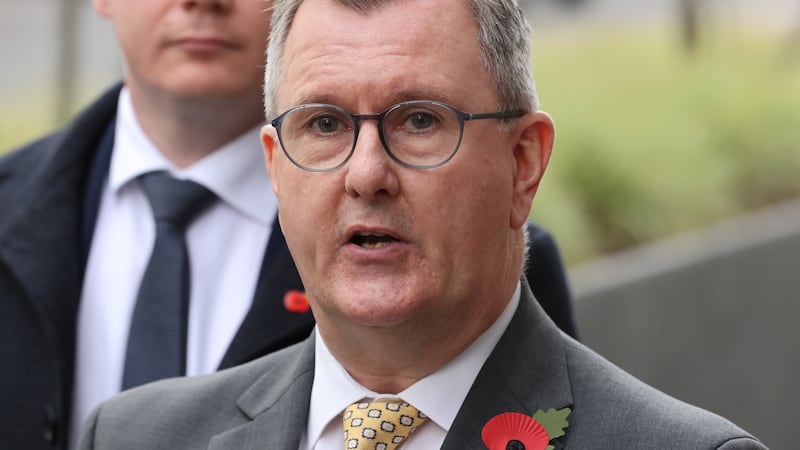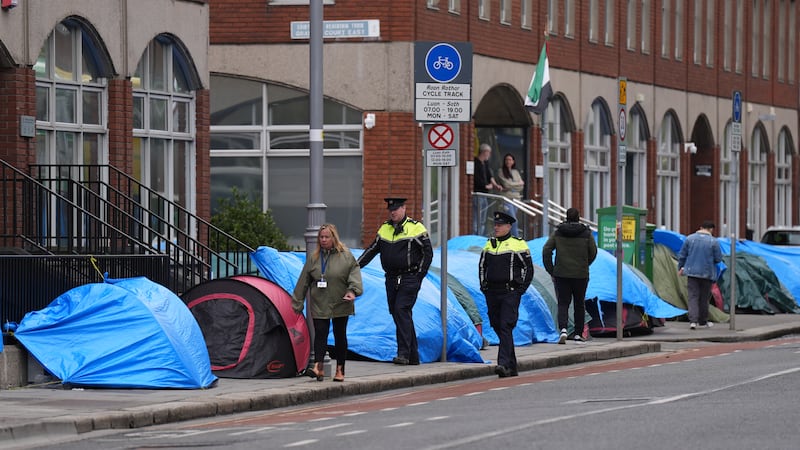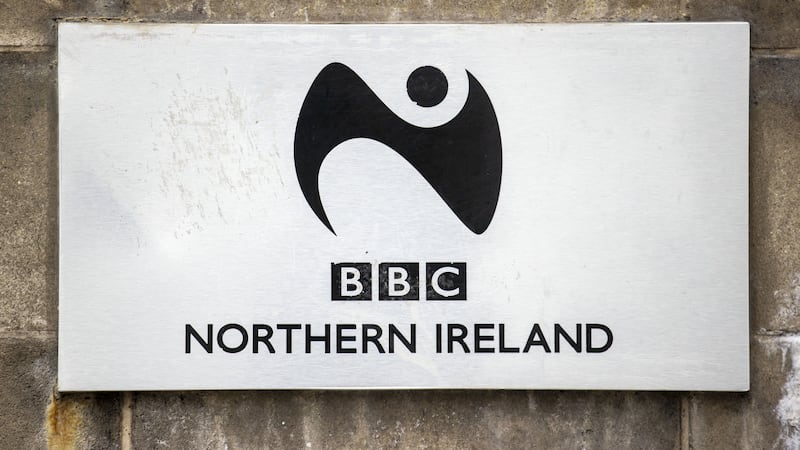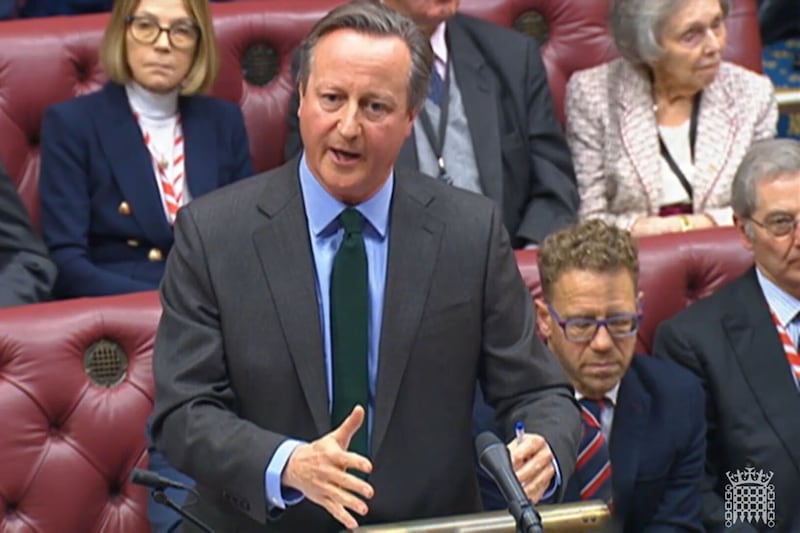THE DUP is expected to come under renewed pressure to end its boycott of the Stormont institutions amid the increasing potential for EU-UK agreement on the protocol.
Brussels Brexit negotiator Maros Sefcovic yesterday signalled that a fresh deal on checks between Britain and the north could happen within weeks, with the right "political will".
His remarks came as British Prime Minister Rishi Sunak and European Commission President Ursula von der Leyen agreed to "work together" to end the row over the protocol, which has led the DUP to boycott power-sharing since February.
Mr Sefcovic made the comments in Westminster during a meeting of British and European parliamentarians.
He said Brussels was not seeking a "political victory" and wanted to "solve the problem".
Discussing EU proposals to reduce checks, he said: "Is it too much to do this? Can we not find pragmatic, technical solutions to make this thing work?"
Earlier, Mr Sefcovic told parliamentarians that he did not believe the EU and the UK were "worlds apart" on the protocol but he warned that unilateral action by the British government would have "serious" consequences.
Later this week Taoiseach Micheál Martin and Mr Sunak are both expected to attend the British-Irish Council in Blackpool in what is seen as a thaw in the recently strained relations between the two governments.
Sinn Féin MLA Declan Kearney welcomed Mr Sefcovic's comments and he urged the British government to engage with the EU "in good faith".
“They should also demonstrate that they have the political will to find an agreement and heed the calls from the EU commission to scrap the damaging protocol bill and focus on reaching an agreement through negotiation," he said.
Alliance deputy leader Stephen Farry said the only way to overcome the issues around the post-Brexit trade arrangements was through negotiations.
“Unilateral action, such as the protocol bill, is a dead-end – pragmatic solutions on a range of issues are doable if both the UK and EU can be creative and build an effective partnership," he said.
SDLP MP Claire Hanna said the increased potential for agreement was "positive news".
"We look forward to further details and to all involved using this as an opportunity to move on, get back into Stormont and get this region back on track," she said.
But DUP MLA Phillip Brett warned that any agreement needed to have the support of unionists.
"There will not be a solid foundation for the Northern Ireland Executive and assembly until the protocol is replaced with provisions that restore our place in the United Kingdom’s internal market and our constitutional arrangements are respected," he said.
The North Belfast representative said Brussels and London were aware of the DUP's "seven tests" for any outcome to the talks.
Invisible checks on the Irish Sea are now being considered by the EU but they were once dismissed as “completely fanciful”, peers heard last night.
Making an intervention, former Labour MP Baroness Hoey, who sits as a non-affiliated peer, asked the DUP Lord Dodds of Duncairn: “Today, Maros Sefcovic actually talked about the need for fewer border checks and in fact that they could be invisible on the Irish Sea border.
“Does he not agree with me then that if it can be invisible on the Irish Sea border, then it can be invisible at the frontier, where of course checks should happen between one country and another independent country?”
Lord Dodds replied: “It appears that things may have moved on because once, all these ideas were dismissed as completely fanciful, indeed, unicorns were brought into play and all sorts of dismissive language was used.
“I’m glad that at least now there’s an acknowledgement that some of these checks can be done in the way that the noble lady has described, that Maros Sefcovic has talked about.
“But the important point here is that we have been told throughout the Brexit process, that there can’t be a single check, or there can’t be a single piece of infrastructure on the Irish border because otherwise that will lead to violence, that that will be attacked, that that will undermine the Belfast Agreement, without a single, hardly anyone, making the obvious point, well, if that is unacceptable, north-south, then it’s doubly unacceptable between Northern Ireland and the rest of the United Kingdom.”
Last night, the UK Government’s attempts to effectively tear up parts of the Protocol cleared their latest hurdle in Parliament.
The Northern Ireland Protocol Bill completed its committee stage in the House of Lords after peers spent four days debating amendments, amid claims it is a “pig of a law”.
The Bill’s biggest test is expected to come when further amendments are discussed and voted on at report stage, given the Government lacks an overall majority in the unelected upper chamber.
Ulster Unionist Party (UUP) former leader Lord Empey said Northern Irish politicians’ backs were “full of dagger holes” because UK ministers had not trusted them to join post-Brexit talks.
He made the claim as he urged the Government to give Stormont’s policy-makers a seat at the negotiating table over Northern Ireland’s post-Brexit trade arrangements.
Lord Empey told peers: “One minister – he meant well, I have no doubt – said a week or two ago, ‘Leave it to us, we have got your back here, we will look after it for you’.
“Well, I have to say, with the greatest respect, we know all about that. Our backs are that full of dagger holes that we know all about it.
“We will only believe what we see and what we hear ourselves. Bring our politicians into the picture, bring them to the table with you, so they are not your enemy.
“I accept, of course, we are dealing with an international issue and foreign affairs and related matters are not devolved. I get that.
“But have we not enough flexibility that we can bring people along as part of our delegation so they can see persons and papers?”
The UK Government has vowed to secure changes to the agreement, either with a negotiated compromise with the European Union or through the Bill, which would empower ministers to scrap the arrangements without the approval of Brussels.
But critics warn the Bill would break international law and risk a trade war with the EU.
Foreign Office minister Lord Ahmad of Wimbledon, closing the committee stage, told peers: “I know there has been much where at the moment there is more detail required, both in terms of regulations and information to be shared.
“I have fully heard also, from my perspective as the minister of state at the FCDO, about the real desire to have more detail in terms of the current discussions taking place, the negotiations framework within the context of our conversations with the European Union, and I do hope that over the coming days again we’ll be able to provide further detail on how things are progressing.”
Independent crossbencher Lord Kerr of Kinlochard previously said efforts to secure changes to the legislation are like “trying to put lipstick on a pig”.
Liberal Democrat foreign affairs spokesman Lord Purvis of Tweed said on Monday evening: “It’s got lipstick on now, it’s got a bit more make-up, we’ve given it a nice frock, but it’s still a pig of a law and that’s not changed.
“It’s illegal, it’s a power grab and it won’t work, and fundamentally those three aspects are what we will have to decide about whether it even goes into report.”








